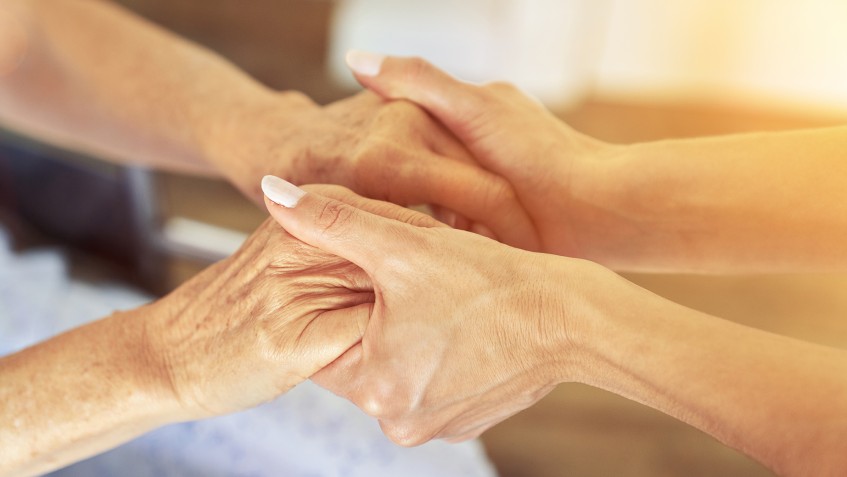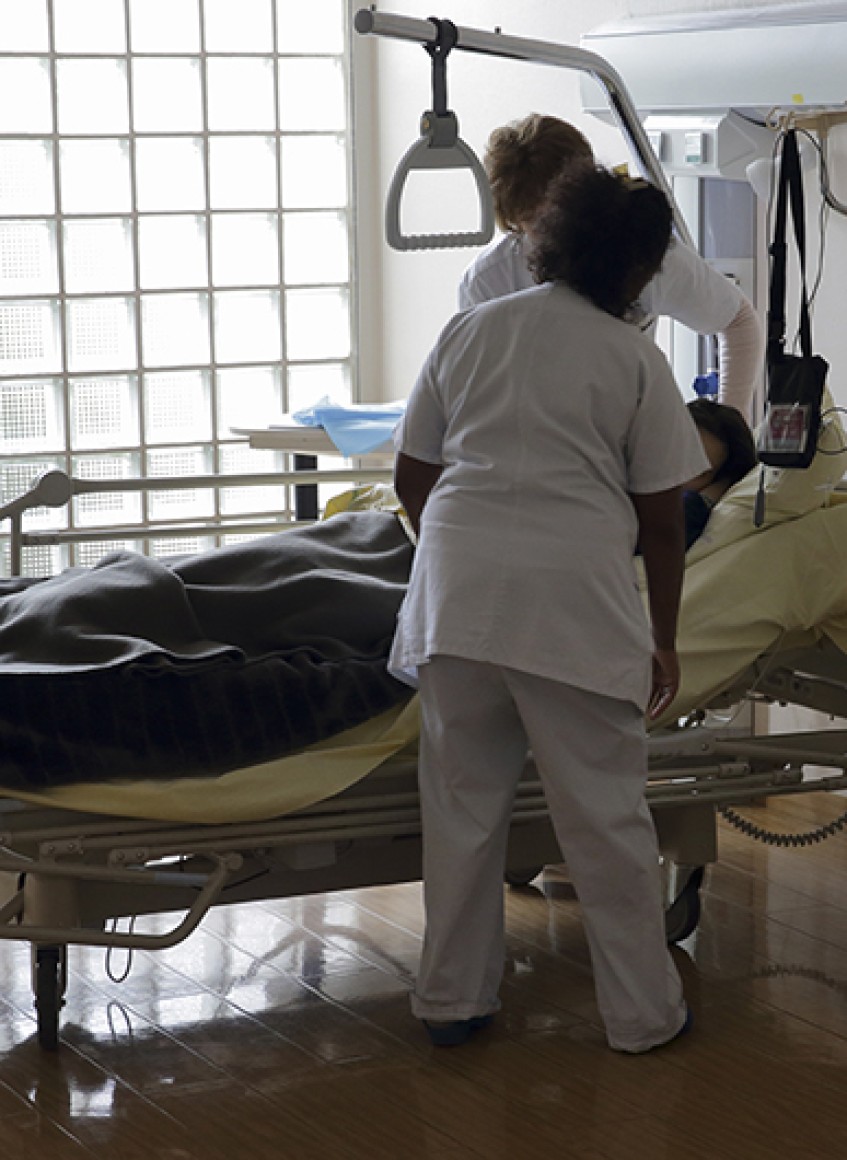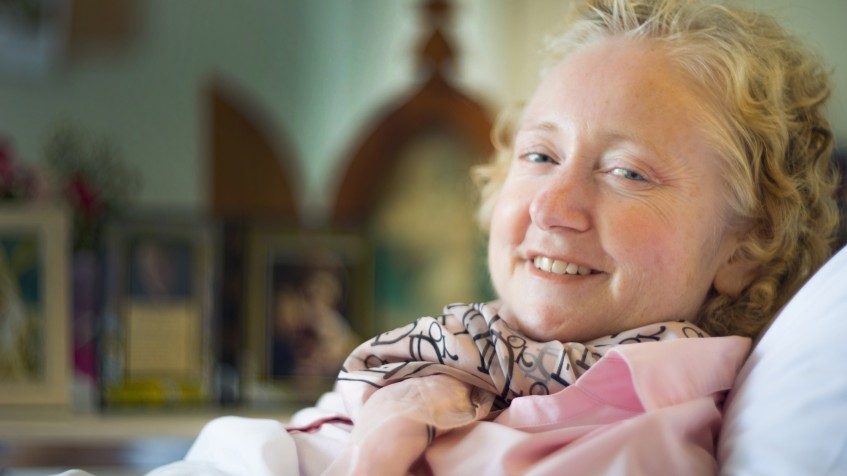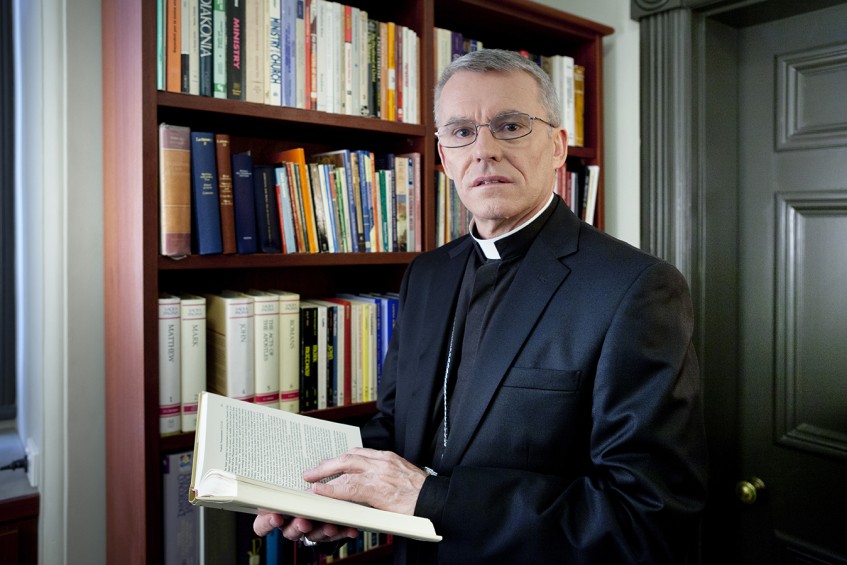EXCLUSIVE: Church in Western Australia enters new world order
The advent of Voluntary Assisted Dying in Western Australia has introduced a totally new feature in the landscape of end-of-life options, and a new challenge for Catholic acute, aged and disability services.

Seniors holding hands for consolation and sympathy. The advent of Voluntary Assisted Dying in Western Australia has introduced a totally new feature in the landscape of end-of-life options, and a new challenge for Catholic acute, aged and disability services. Photo: Adobe.
By Jamie O'Brien
The Catholic Church in Western Australia has this week entered a new world order with the enacting of the 2019 Voluntary Assisted Dying Bill.
The legislation, passed by the McGowan government on 10 December 2019, allows Western Australians who are terminally ill the right to end their life at a time of their choosing.
This means that the legislation will apply to the WA Catholic heath care acute, aged and disability sector, including St John of God Hospitals, MercyCare, Mercy Health, Catholic Homes, Southern Cross Care, Nazareth Care, Little Sisters of the Poor and Mount La Verna aged care facilities, in addition to Identitywa as a disability care service, and the University of Notre Dame Australia as a medical teaching facility.
Those who make the decision to end their life must be diagnosed with a terminal 1 illness or medical condition that will on the balance of probabilities cause death within six months, or within 12 months for some conditions.
The person must have decision make capacity in relation to voluntary assisted dying
During the process the person must make three separate requests for voluntary assisted dying: a first request, a written declaration and a final request. The written declaration must be witnessed by two people who meet specific requirements.
In light of legislation being enacted on Thursday 1 July, Perth Archbishop Timothy Costelloe SDB last week delivered a decisive Pastoral Letter, which highlighted that every human life, from its earliest beginnings at conception to its final moments leading to death, is precious and sacrosanct.
“No-one has the right to ‘step in’ and bring to an end a life that has begun under God’s providence and will come to its end under God’s providence,” Archbishop Costelloe explained.
“We also believe, precisely because life is precious and sacred, that it is to be respected at every moment: when the child is still in its mother’s womb, when it grows to be an infant, then a young child, then an adolescent and an adult.
“We believe that whether a person is sick or well, weak or strong, poor or wealthy, in agreement with us or in opposition to us, educated or illiterate, generous or selfish, faithful or faithless, living or dying, that person is to be treated with dignity and respect: everything that can be done to give meaning and hope to every person must be done,” Archbishop Costelloe wrote.
In an exclusive interview with Archdiocesan Communications Manager and The Record Editor Jamie O’Brien, LJ Goody Bioethics Director, Rev Dr Joe Parkinson explained how the legislation will be operationalised within the WA Catholic health care sector acute care, aged care and disability care organisations.

Nurses provide care to a patient in the palliative care section of a hospital in Victoria. Photo: CNS/Philippe Wojazer, Reuters.
“Our services have agreed that we will not provide or facilitate VAD,” Dr Parkinson explained.
The acute care, aged care, disability care and community services elements of the WA Catholic health care sector represent some 2000 private and public hospital beds and more than 6000 residential and home care packages across Western Australia.
“The WA Catholic health, disability and aged care sector work to provide the best care possible for our patients, residents and clients, and for our staff who will have to adjust to the advent of VAD,” Dr Parkinson explained.
Dr Parkinson continued by highlighting that each Catholic health, disability and aged care service provider has agreed on basic principles that preserve the long-standing Catholic commitment to excellent end-of-life care, and each service will develop its own protocols for operationalising those principles.
“To begin with, we recognise that wherever we deliver aged care or disability care services, it will usually be in the client or resident’s own home setting and they have a right (under Federal legislation) to make any other care arrangements they like.
“So, we cannot impede their right to seek VAD privately, and we will comply with the VAD Act in providing statutory information about VAD.
“However, we will not authorise any of our caregivers to be involved in any of the steps required for the client to access VAD, including facilitating assessments for eligibility and helping them to obtain and use the VAD substances.
Dr Parkinson continued by explaining that the Catholic sector wants residents and clients to talk to them freely about any care concerns they may have, including seeking information about VAD or their wish to access VAD.

Anna Corry poses in her bed March 16 at Neringah Hospital, a palliative care facility in Wahroonga, Australia. The 50-year-old former nursing educator, who had endured an aggressive type of breast cancer since her diagnosis in January 2016, died Holy Thursday, March 29. Photo: CNS/Giovanni Portelli.
“We are training staff to be available for these conversations, so that we can identify and deliver the kind of care the resident or client actually needs at the time,” Dr Parkinson explained.
“If a resident or client wishes to consult a VAD Navigator they will be able to do so privately, even on our premises, but our staff will not be authorised to assist, other than to put the resident or client in touch with the Navigator Service for the purposes of obtaining information.
If a resident or client wishes to consult an external doctor for the purposes of VAD eligibility assessment and associated processes, they will also be free to do so. However, Catholic sector staff will not assist in any way.
It is also against the law for health care workers to raise the issue of voluntary assisted dying with a resident or client.
“If a resident or client wishes to make private arrangements to receive and use VAD substances they will not be impeded, but again our staff will not be authorised to assist in any way,” Dr Parkinson emphasised.
“And we will need to pay close attention to the safe storage of and access to the substances,” he said.
Staff do also not have to talk about voluntary assisted dying with the resident or client if they don’t want to – also known as ‘conscientious objection’.
Dr Parkinson also noted that the Catholic sector does not want to see patients, residents of clients transfer out of their facilities for the purposes of obtaining VAD.
‘’Although of course we will not impede any who wish and are assessed as clinically safe to do so.

In light of VAD legislation being enacted on Thursday 1 July, Perth Archbishop Timothy Costelloe SDB delivered a decisive Pastoral Letter on 23 June, highlighting that every human life, from its earliest beginnings at conception to its final moments leading to death, is precious and sacrosanct. Photo: Ron Tan.
“Likewise if a hospital asks to return a resident or client to our care we will accept them, even if they intend to pursue VAD, but our staff will not be authorised to assist with the VAD process itself,” Dr Parkinson said.
“Our basic stance is that we would prefer to look after all our patients, residents and clients ourselves, because we believe we are able to provide the best available standard of care in all of its physical, psychological, social, and spiritual dimensions.
“That includes end-of-life care,” he said.
Ending his Pastoral Letter published last week Wednesday 23 June, Archbishop Costelloe highlighted the need to support, through prayer and encouragement, all those who are engaged in the healing and caring ministry of the Church.
“Our Catholic hospitals, our Catholic aged-care facilities, our Catholic nursing homes and our Catholic Social Outreach agencies are already committed to being places of compassion, of healing, and of hope.
“With the legalisation of VAD, the witness of all these wonderful institutions to the Catholic understanding of the dignity and sanctity of every human life will become even more important. “It will also become more challenging.”
More to come in next week’s edition of The eRecord
